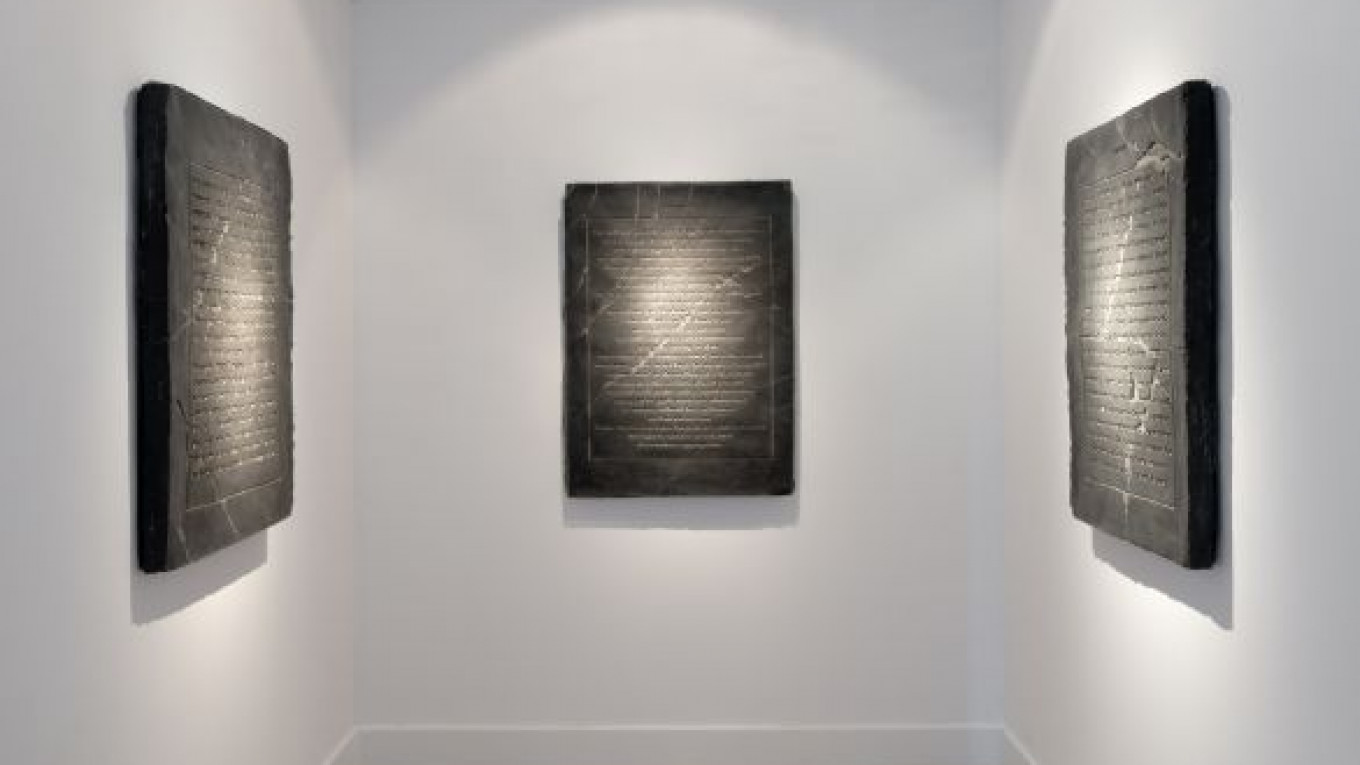LONDON — The human search for perfection, the rise of social media as a new religion and the ways our society will be remembered by future generations — these are just some of the themes being tackled by Russian artists Andrei Blokhin and Georgy Kuznetsov in a new exhibition in Gazelli Art House, London.
The two artists, who together form the art collective Recycle Group, organized the exhibition "Last Space Remaining" with renowned Spanish artist and designer Sergio Calderon. Together, through their different yet complimentary approaches, they explore notions of fantasy and reality.
"Last Space Remaining" is set over two floors, with the upper floor devoted entirely to Recycle Group's work. The central theme is the human hunt for perfection and the insurmountable gap between this and reality, and the exhibition is arranged to mirror this paradoxical search.
The curator of the exhibition, director of Gazelli Art House Mila Askarova, said their works were above all social commentaries on modern day living, with a central focus on "how our time today will be remembered in the future."
In recent years, Recycle Group, who won the Kandinsky Prize for Best Young Artist Project of the Year in 2010, have held solo exhibitions in Moscow, Paris, Helsinki and Kiev. This is their first major exhibition in London and may be the start of many more. Their participation in "Last Space Remaining" follows their successful solo exhibition "Paradise Network" at Moscow's MultiMedia Art Museum earlier this year.
As their name implies, recycling is a central tenet of their work, and Blokhin and Kuznetsov make use of both recycled materials and recycled or familiar imagery in their pieces. Their work on display at "Last Space Remaining" focuses on today's virtual world, and the rapidly blurring lines between virtual and social reality, particularly in the medium of Facebook. Each piece in the exhibition forms part of a theoretical, archeological excavation of the present, taking place in the future.
These themes are encapsulated in the work "Tablets of the Covenant." This piece consists of a series of phone tablets cast in stone, on which the artists have inscribed the Ten Commandments of modern day living, drawing inspiration from the real terms and conditions of social networks. Facebook is presented as a new social system, complete with its own laws, customs and rituals. In an interview with The Moscow Times, Blokhin explained, "We tried to make the virtual material through the use of sculpture."
The exhibition also includes "Cultural Layer: Skeleton," a large rectangular cast built from everyday objects, a work that asks which of today's artifacts will survive the test of time. The piece is central to the artists' vision, and questions what from our time will survive in history.
Nonetheless, the piece that attracted the most interest at the preview of the exhibition was Manhole. This featured a manhole cover placed on an electric motor, causing it to spin in circles around the floor. Reactions to the artwork were mixed and highlighted the role that cultural background plays in the viewers' appreciation of art: While those with a Russian background immediately recognized the manhole as a symbol of humor — Russians regularly question their strength when walking in the streets — those from an English background were more puzzled by the work. Asked about the manhole, Blokhin laughed and noted it had been created to add some fun to their previous show in Moscow, which was otherwise very serious.
Recycle Group have an interesting relationship with their Russian heritage. Askarova said: "They have a contemporary approach to art. Their works do not appear quintessentially Russian, although the artists bring their national background into their work."
The artists are in fact part of a growing group of young Russians who are breaking away from the cultural influences of Russia. In Russia, the art collective is known by its English name, which Blokhin admits some Russians initially found difficult to pronounce. He said: "We do not focus our mind on the cultural background of our country. We are the generation that was born at the end of the 1980s, and the background of the Soviet Union does not play such a big role in our lives. We try to see the more global problems in the world."
"Last Space Remaining" will run from Sept. 27 to Nov. 24 at Gazelli Art House, 39 Dover Street, London. For more information, see the gallery website at gazelliarthouse.com
Contact the author at [email protected]
A Message from The Moscow Times:
Dear readers,
We are facing unprecedented challenges. Russia's Prosecutor General's Office has designated The Moscow Times as an "undesirable" organization, criminalizing our work and putting our staff at risk of prosecution. This follows our earlier unjust labeling as a "foreign agent."
These actions are direct attempts to silence independent journalism in Russia. The authorities claim our work "discredits the decisions of the Russian leadership." We see things differently: we strive to provide accurate, unbiased reporting on Russia.
We, the journalists of The Moscow Times, refuse to be silenced. But to continue our work, we need your help.
Your support, no matter how small, makes a world of difference. If you can, please support us monthly starting from just $2. It's quick to set up, and every contribution makes a significant impact.
By supporting The Moscow Times, you're defending open, independent journalism in the face of repression. Thank you for standing with us.
Remind me later.






